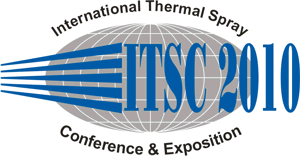
|
| Abstract No.: |
|
Scheduled at:
|
Monday, May 03, 2010, Sophia Room 2:40 PM
Cold Spraying 2
|
|
| Title: |
Influence of helium and nitrogen gases on the properties of cold gas dynamic sprayed pure titanium coatings
|
|
| Authors: |
Wilson Wong / McGill University, Canada
Stephen Yue / McGill University, Canada
Eric Irissou/ National Research Council Canada, Canada
Jean-Gabriel Legoux*/ National Research Council Canada, Canada
|
|
| Abstract: |
Cold gas dynamic spray is a fabrication process in which micron-scaled solid particles are accelerated to supersonic velocity then collided onto substrates where they plastically deform and bond to produce a coating. Current research has demonstrated that higher particle impact velocity enhances the quality of Ti cold sprayed coatings. The general approach to attain superior velocity when using nitrogen as the propelling gas under atmospheric conditions is to increase its temperature. Unfortunately, two detrimental effects can occur as a result: oxidation and nitridation. These unfavorable reactions could be avoided when helium is used both as a propellant and as background atmosphere. For this work, several conditions were studied: using nitrogen as the propellant gas under normal atmospheric conditions and achieving maximum particle velocity at maximum inlet temperature of 800°C, using helium as the propellant gas and background atmosphere to achieve the same particle velocity by adjusting the inlet gas temperature and to also achieve maximum particle velocity at maximum inlet temperature of 800°C. The resulting coatings were characterized using optical microscopy, scanning electron microscopy, and microhardness measurements. In addition, X-ray photoelectron spectroscopy (XPS) was used to identify the occurrence of oxidation and nitridation.
|
|
